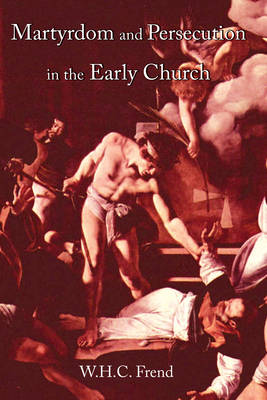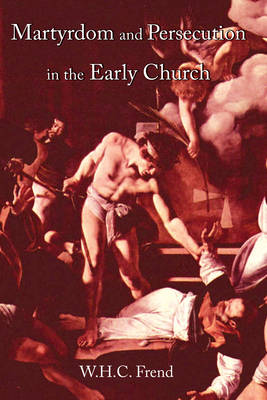
Bedankt voor het vertrouwen het afgelopen jaar! Om jou te bedanken bieden we GRATIS verzending (in België) aan op alles gedurende de hele maand januari.
- Afhalen na 1 uur in een winkel met voorraad
- Gratis thuislevering in België vanaf € 30
- Ruim aanbod met 7 miljoen producten
Bedankt voor het vertrouwen het afgelopen jaar! Om jou te bedanken bieden we GRATIS verzending (in België) aan op alles gedurende de hele maand januari.
- Afhalen na 1 uur in een winkel met voorraad
- Gratis thuislevering in België vanaf € 30
- Ruim aanbod met 7 miljoen producten
Zoeken
Martyrdom and Persecution in the Early Church
A Study of Conflict from the Maccabees to Donatus
W H C Frend
Paperback | Engels
€ 128,45
+ 256 punten
Omschrijving
Although the story of the triumphant rise of Christianity has often been told, it was a triumph achieved through blood and tribulation. The literal meaning of the term martyr meant witness, but among early Christians it quickly acquired a harsher meaning--one who died for the faith--and that witness through death was responsible for many conversions, including those of Justin Martyr, who himself offered just such witness, and perhaps even Tertullian. Persecution was seen by early Christians, as by later historians, as one of the crucial influences on the development of the early church and Christian belief. Why did the Roman Empire persecute Christians? Why did thousands of Christians not merely accept, but welcome martyrdom? In his classic work, Martyrdom and Persecution in the Early Church, the late W. H. C. Frend explores the mindset of Christians who suffered persecution as well as the motivations of those who persecuted them. He shows the critical importance of Jewish ideas to early Christians, heavily influenced as they were by the story of Daniel and the revolt of the Maccabean. He argues that the Christian concept of martyrdom held in such high regard among early Christians can only be understood as springing from Jewish roots. Frend explores a number of major persecutions to show both common themes and variations, and examines also the relationship between the heavenly kingdom of Christ and the rule of the earthly emperor. In doing so, he shows how persecution formed an essential part in a providential philosophy of history that has profoundly influenced European political thought.
Specificaties
Betrokkenen
- Auteur(s):
- Uitgeverij:
Inhoud
- Aantal bladzijden:
- 643
- Taal:
- Engels
Eigenschappen
- Productcode (EAN):
- 9781625648044
- Verschijningsdatum:
- 15/04/2014
- Uitvoering:
- Paperback
- Formaat:
- Trade paperback (VS)
- Afmetingen:
- 140 mm x 216 mm
- Gewicht:
- 757 g

Alleen bij Standaard Boekhandel
+ 256 punten op je klantenkaart van Standaard Boekhandel
Beoordelingen
We publiceren alleen reviews die voldoen aan de voorwaarden voor reviews. Bekijk onze voorwaarden voor reviews.









